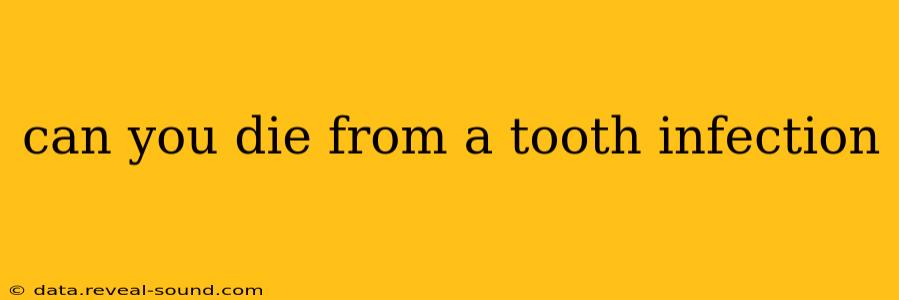Can You Die From a Tooth Infection? Understanding the Risks of Untreated Dental Infections
The short answer is yes, although it's rare, you can die from a severe, untreated tooth infection. While most dental infections are easily treatable with antibiotics and professional dental care, neglecting them can lead to serious, even life-threatening, complications. This article will explore the potential dangers, the progression of infection, and the importance of seeking prompt dental care.
What Happens When a Tooth Infection Goes Untreated?
A tooth infection, or dental abscess, occurs when bacteria invade the pulp (the inner part of the tooth containing nerves and blood vessels) or surrounding tissues. Initially, you might experience mild pain, swelling, and sensitivity. However, left untreated, the infection can spread rapidly.
The bacteria release toxins that can enter the bloodstream, causing a condition known as bacteremia. While a brief instance of bacteremia might not be harmful to a healthy individual, persistent or severe bacteremia can overwhelm the immune system.
Can a Tooth Infection Lead to Sepsis?
One of the most significant dangers of an untreated tooth infection is the risk of sepsis. Sepsis is a life-threatening condition triggered by the body's overwhelming response to an infection. When bacteria from the infected tooth spread throughout the body, the immune system's reaction can cause widespread inflammation, organ damage, and potentially death. The symptoms of sepsis can include high fever, chills, rapid heart rate, rapid breathing, and confusion. It requires immediate medical attention.
What are the other potential complications of a tooth infection?
Besides sepsis, untreated tooth infections can lead to several other severe complications, including:
- Cellulitis: A spreading infection of the soft tissues of the face and neck.
- Ludwig's Angina: A severe cellulitis that affects the floor of the mouth, potentially causing airway obstruction.
- Cavernous Sinus Thrombosis: A serious blood clot in the brain's cavernous sinus, which can lead to stroke or meningitis.
- Osteomyelitis: A bone infection affecting the jawbone.
How common is death from a tooth infection?
Death from a tooth infection is relatively uncommon, especially in developed countries with access to modern medical care. However, the risk is significantly increased in individuals with weakened immune systems, underlying health conditions, or delayed treatment. The key here is timely intervention.
What are the signs and symptoms of a serious tooth infection?
It's crucial to recognize the warning signs of a severe tooth infection requiring immediate medical attention. These can include:
- Severe, throbbing pain: Pain that doesn't respond to over-the-counter pain relievers.
- High fever and chills: Indicating a systemic infection.
- Swelling of the face and neck: Significant swelling that extends beyond the immediate area of the infection.
- Difficulty breathing or swallowing: Suggests the infection is affecting the airway.
- Pus draining from the gums or mouth: A visible sign of a severe infection.
When should I seek medical attention for a tooth infection?
Don't delay seeking professional help if you suspect a tooth infection. Early intervention significantly reduces the risk of serious complications. Contact your dentist or doctor immediately if you experience any of the symptoms mentioned above.
How is a tooth infection treated?
Treatment typically involves a combination of:
- Root canal therapy: To remove the infected pulp and clean the tooth.
- Antibiotics: To combat the bacterial infection.
- Drainage of an abscess: To relieve pressure and promote healing.
- Extraction: In some cases, the tooth may need to be extracted.
In conclusion, while death from a tooth infection is rare, it's a serious possibility if left untreated. Prompt dental care is vital to prevent potentially life-threatening complications. Don't hesitate to seek medical attention if you experience any concerning symptoms. Your life may depend on it.
